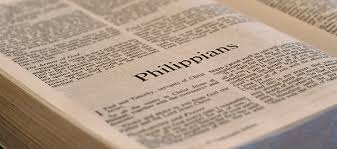"From There to Philippi" -- Acts 16:1-18
 Wednesday, March 7, 2018 at 11:31AM
Wednesday, March 7, 2018 at 11:31AM  The First in a Series of Sermons on Philippians
The First in a Series of Sermons on Philippians
We are beginning a new series on two of Paul’s letters, Philippians and then Colossians. Some of you may be asking, “why begin a series on Paul’s letter to the church in Philippi by starting in the sixteenth chapter of the Book of Acts?” I am doing so because the entire sixteenth chapter of the Book of Acts is devoted to the establishment of the first Christian churches on the European continent, including the founding of a church in the Roman city of Philippi, named for Phillip II, the father of Alexander the Great. Acts 16 contains the record of Paul’s second missionary journey about 50 AD. Since Luke (the author of Acts) give us such a detailed account of Paul’s bold preaching of the gospel which led to a church being founded in Phillipi, this passage serves as a good place to start our series, so that we know something about the church to which Paul sends his Philippian letter a dozen or so years later, in 62 AD, while the Apostle was imprisoned in Rome.
In verses 6-10 of Acts 16, Luke recounts the so-called “Macedonian call.” Paul has a vision of a man urging him come and preach the gospel in Macedonia (a region in Greece). In the 16th chapter of Acts we also find the account of the conversion of Lydia (vv. 11-15)–possibly the first convert to Christianity on the European mainland–followed by Paul’s encounter with a demon-possessed girl, which led to Paul’s arrest (vv. 16-24). And then there is the wonderful account of the conversion of the Philippian jailer (vv. 25-34). All of these events are behind the formation of a church in Philippi to which Paul writes his letter some years after first visiting the area and preaching the gospel. So, before we take up the text of Paul’s Philippian letter next week, we will begin with a survey of Acts 16, and Luke’s account of the initial spread of the gospel into Europe.
In the 16th chapter, Luke describes events which transpired while Paul, Silas, Timothy, and Luke were together in the city of Philippi. The background to Paul’s arrival in the city is the Jerusalem Council recorded in Acts 15, when the Apostles and elders of the church gathered to settle the question of Gentile salvation. After the council had concluded, Paul and Silas made a pastoral visit to those churches which were founded during Paul’s previous journey to Galatia (in what is now central Turkey). These churches faced the threat of Judaizers–those who were teaching that in addition to believing that Jesus was Israel’s Messiah, one must also be circumcised, and even embrace elements of Jewish religion–keep the Jewish feasts, eat a kosher diet, etc. Silas was one of those commissioned by the churches to take the Jerusalem Council’s decree to the newly founded churches in Galatia plagued by this false teaching (Acts 15:22).
Prevented by the Holy Spirit from going to Asia Minor and Bythinia (Acts 16:6), Paul, Silas and two others newly added to the group, Timothy and Luke, crossed the Aegean Sea. In response to the vision given him (the “Macedonian call”), Paul began to preach the gospel in Macedonia on the European mainland. The reason why the Spirit prevented Paul and the others from going back to Asia Minor now becomes clear–God had other plans for Paul, namely taking the gospel to the very heart of Gentiles lands in Europe. We read in verses 11-12. “So, setting sail from Troas, we made a direct voyage to Samothrace, and the following day to Neapolis, and from there to Philippi, which is a leading city of the district of Macedonia and a Roman colony. We remained in this city some days.”
Phillipi was the site of a fierce battle in 42 BC when Mark Anthony and Octavian defeated the forces of Brutus and Cassisus, Julius Caesar’s assassins. When Octavian and Mark Anthony subsequently fought one other in 31 BC (the battle of Actium), Octavian ordered that the city become a colony for Antony’s disbanded army. This is why Phillipi is a Roman city (non-Greek) with little if any Jewish population. The city was located on the Via Egnatia, an important Roman road running from Italy to Asia Minor. Phillipi was a very important place for a Christian church. As we read in our Old Testament lesson from Isaiah 49, the messianic prophecy regarding YHWH’s servant, indwelt by the Spirit, who will be proclaimed to the nations begins to unfold in the light (truth), righteousness, and justice proclaimed to the Greeks and Romans by the Apostle Paul.
To read the rest of this sermon: From There to Philippi


Reader Comments